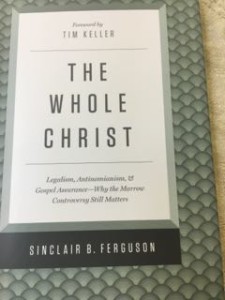 I got a bit distracted in March but I have been reading and making notes, so let’s get back to the Bible.
I got a bit distracted in March but I have been reading and making notes, so let’s get back to the Bible.
Hebrews 2 has that phrase “it says somewhere”. Of course, Psalm 8 hadn’t been numbered as a chapter yet.
Reading plan had me in Psalm 39 and Hebrews 12 at the same time. Both are valid perspectives on discipline.
Leviticus – notice many times the blood and maybe fat portions of the animal are in the tabernacle but the rest of the animal is burned outside the camp. Of course, Jesus was crucified outside the camp, in order to open the temple – Hebrews 13 comments on this. As all of Hebrews stresses, God was replacing the old system with the new system.
Matthew 2 – In bringing Jesus out of Egypt, Joseph is aware enough to have concerns. I imagine some serious prayer for guidance and reassurance led to that dream with instructions on where to take him.
Matthew 4 and the wilderness – Know your Scripture and know your God. Much easier to trust when you know the person you are trusting. But it does take trust and believing God. Even Satan knows the Scriptures.
One of my notes from this chapter says if God is leading us by a path where there is no bread then He will sustain me without bread.
I also have a quote from Journey to the Cross Lenten Readings:
Our wilderness is not literal, but it is very real. We are tempted – perhaps even determined – to sustain ourselves, to escape our vulnerability, and to chase our aspirations without thought of others.
Matthew 5 – the Sermon on the Mount. What a great reminder that I never keep the law perfectly. Even if I do good, my motivation is shaky, and/or my thoughts about telling what I did or not lead me into sin.
This fit in well with our study of Romans this month where Paul says the law showed him his sin in Romans 7:7. He mentions sin used this command to arouse all kinds of covetous desires within him, Romans 7:8. Coveting is the one command where you can’t ignore the internal thoughts and feelings. As Christ countered in the Sermon on the Mount, the other commands could be and had been reduced to external actions. But the Ten Commandments are about so much more than just actions. Christ shows, and Paul is convicted by the inward attitudes and heart issues, it is about being discontent with what God has given you.
Exodus 4 has an interesting story that most of us probably skip over in confusion. But this great article from the Gospel Coalition shows some people wrestle with these kinds of Scriptures and what some of the options are for interpretation. We have gone a long way from the allegory option, but sometimes it’s a good choice.
Exodus 6:20 – the translation I was reading today says father’s sister (that would be an aunt). The septuagint says cousin per a note in my Bible. I have a few different commentaries and most of them didn’t even mention this, but the Reformation Study Bible points out this may be an argument for the authenticity of the lineage, since a white-wash job would have avoided revealing a relationship that was later forbidden by the law.
Exodus 10 – the Ten Commandments – back to the Sermon on the Mount and Romans 7.
Exodus 32 is where the people give their gold to Aaron who throws it in the fire, and lo and behold, out popped this calf to worship. 🙂 Aaron tries hard to not take responsibility, doesn’t he. What struck me today was that the prior several chapters were God describing to Moses how the people could contribute and participate in building His tabernacle. A place of great beauty and to be filled with His holiness. But who has time to wait for detailed instructions and then more time to spend collecting materials and carving or sewing or weaving or engraving. So much easier to throw money at the problem and go with whatever pops out of that. God requires more from us, but He gives so much more to us.
While in Florida, my cousin Kate sent me a text
Hey, you. How are things? Whatcha reading?
It was like she was watching me, because I was indeed reading the moment her text came. So I snagged a photo and replied.
I am enjoying this book. It is part history (but so well explained) and part theological study (but not heavy) and part devotional (and oh so sweet to the soul). I have been convicted, encouraged, and educate by this book. It’s my idea of a fun read.
I hope you are finding as much joy and fulfillment in your Bible reading as I am. Remember, the link to the reading plan I’m using this year is to the right. But any plan will do or no plan at all, just take up and read!




